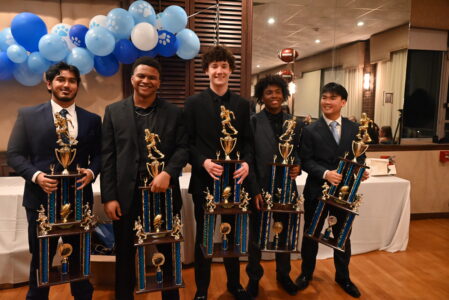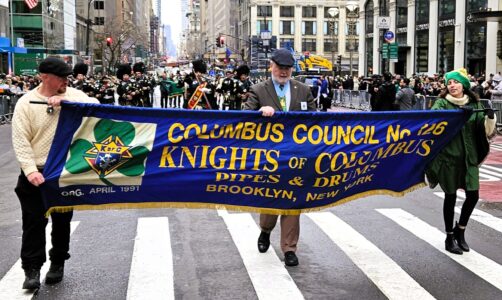Citing a litany of concerns including overcrowded schools, trash issues, already congested streets and the aesthetic impact of building a new, eight-story senior/affordable housing development on Fourth Avenue where the now-shuttered Zion Lutheran Church now stands, residents of 63rd and 64th Streets in Sunset Park have made it clear to proponents of the plan that they are not at all happy about what is being proposed for their small section of the neighborhood.
At a community meeting held at P.S. 971 across the street from the church, a standing-room-only crowd told Jay Marcus, director of housing development for the not-for-profit Fifth Avenue Committee (FAC) and Kathleen Schmidt, assistant to the bishop for finance and administration for the Metropolitan New York Synod for the Evangelical Lutheran Church in America, that the plan raised many concerns for neighbors on the adjacent streets, which are characterized by low-scale rowhouses that they said would be overshadowed by the new construction.
“We don’t have the infrastructure in place of all these buildings,” contended Christopher Robles, who said, “The schools are already overcrowded. You’re going to build to the sky and how is anyone going to get around? Nobody gives a damn about the people who live here. Everyone is just worried about the almighty dollar. This is not fair to the people who live here.”
“This is going to change the entire character of the neighborhood,” another man interjected. “All of a sudden, we will have a Fourth Avenue that looks more like Manhattan.”
One resident in the room wanted to know why the synod wasn’t selling the property to the city’s Department of Education so a school could be built there. DOE, Schmidt responded, “had no interest in purchasing the property. They wanted to rent.” That, she added, left the synod “still stuck with a church building falling apart and having to maintain it.”
Another man wanted to know why the synod had not responded to interest in the sanctuary from the Asian church next door. “The market price they would have had to pay I was told was unrealistic,” replied Schmidt.
The project’s next door neighbor strenuously objected to it as well. “I grew up being poor. I worked to buy my house. Now, I am going to have a box in my backyard,” he complained. He also worried about Access-a-Ride vehicles blocking his driveway. “It’s going to be a mess,” he predicted, charging, “You are forcing my family out.”
After decades in the shadow of the Gowanus Expressway, which had “destroyed” the community, Sunset Park is finally “stable,” one woman at the rear of the room said, with “little drugs, no gangs. I feel safe walking down this block.” But, she added, all that could change if the proposed building is constructed, driving long-time residents out of the neighborhood.
“Now, there are going to be all these new people, we could have serious problems,” she asserted, “if it brings crime, brings drugs.
“You’re totally disregarding these people,” the woman charged.
The plan being pursued by FAC with the backing of the synod calls for a new structure in place of the old church and adjacent building that would conform to existing zoning along the strip, where density was increased in 2008 during the overall rezoning of Sunset Park, part of a deal to preserve the neighborhood’s low rise residential side streets.
Thanks to the rezoning, Marcus said, “Eight-story buildings will be happening, whether they sell to us or another developer,” the difference being, he contended, that FAC is committed to affordable housing that can keep long-time residents in the community (a lottery would be used to choose residents, with a preference given to residents of Community Board 7 for 50 percent of the units).
In addition, he said, FAC wants to work with residents as much as possible to make the development acceptable to them. “We are hoping to be a neighbor that fits in,” he said. Nonetheless, he added, “We are not going to be able to meet everything everyone wants.”
At this point, there is a memorandum of understanding between the synod – which, Schmidt said had opted for a less-lucrative deal that fits in with its mission of community service — and FAC, but the property has not yet been sold.
It’s the fact that the synod is selling at a lower price than market rate that made the location a possibility for the project, Marcus said, in response to a question as to why FAC was not building elsewhere. “We want to build affordable housing which is a big need in Sunset Park, but we couldn’t afford to buy most properties,” he explained.
The new development would include 49 apartments for low-income seniors, 55 and older as well as 18 apartments for low-income families. No parking is included in the development, but Marcus told his listeners it should not be an issue because “seniors and low-income people don’t own cars,” a response that drew an outcry from the crowd. To alleviate concerns, Marcus did say he would ask the city if parking regulations could be changed on the side of Fourth Avenue where the church now is “from meters to alternate side.”
A major impetus behind the plan, said Marcus, is the paucity of rent-stabilized housing in Sunset Park, where 50 percent of the housing stock is in two to four-family buildings, and where rents have been rising as the neighborhood has gentrified. “We heard from many people, ‘We need housing,’” he told the group. The decision to go with mostly senior housing, Marcus said, came out of FAC’s awareness “of the school overcrowding issue.”
Besides the new construction, two adjacent townhouses at 414 and 416 63rd Street would be included in the project. They would be restored, and would include three apartments for low-income families in each. Ten percent of the units will be accessible to accommodate people with disabilities.
No residents have been selected yet for the units, though Marcus said two families in the affordable housing would come from a neighborhood domestic violence shelter. He also said that several homeless seniors who utilize the United Sunset Park Senior Center were “going to be the first priority.”
The plan is for the ground floor and cellar of the new building to house the next-door health center, whose lease is winding down.

 Tigers celebrate a season of success
Tigers celebrate a season of success  Irish march in mother of all St. Patrick’s parades
Irish march in mother of all St. Patrick’s parades